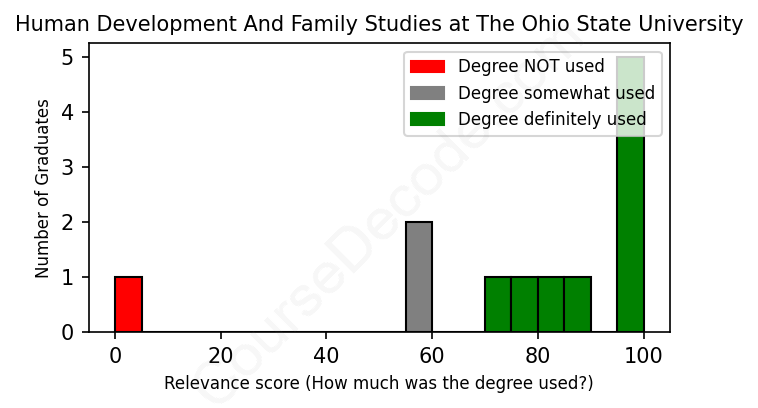
First, some facts. Of the Human Development And Family Studies graduates from The Ohio State University we've analyzed , here's how many have used (or NOT used) their degree in their career:

These are estimates based on AI analysis of 12 LinkedIn profiles (see below).
The verdict? Above average. Overall, with an average relevance score of 77%, Human Development And Family Studies graduates from The Ohio State University have a higher likelihood (+10%) of finding work in this field compared to the average graduate across all fields:
And for comparison, here's the chart for all profiles we've looked at across all degrees.
Also, after graduating, 75% of these graduates have pursued further education other than another Bachelor's degree (such as a Masters degree or other), compared to the average across all profiles of 35%. This suggests you may need more than just a Bachelors degree to be competitive as a Human Development And Family Studies graduate.
See the details:
|
Relevance score: 100% We think this person has gone into a career highly relevant to their degree. We think this person has gone into a career highly relevant to their degree.
DEGREE INFOGraduated in 2020 from The Ohio State University with a Bachelor of Science - BS in Human Development And Family Studies. No other secondary education since. JOB HISTORY SINCE GRADUATIONDesignated Faculty Assistant Kenston Middle School Oct 2020 - Jun 2021 Substitute Teacher  Howland Local School District Oct 2021 - Dec 2021 Substitute Teacher  Kirtland Local Schools Jan 2022 - Present Substitute Teacher  Willoughby-Eastlake Schools Jan 2022 - Present ABOUTI am a reliable, focused worker with years of experience working various jobs. Mostly, I work with school age children in some educational or community setting. My mom is a sports and recreation director for the community I grew up in, and she always inspired me to want to help communities in any way that I can. I have been working for her since I was 15, and I have learned a lot. I act as referee and table official for basketball, volleyball, and soccer. These years of regulating games, recording statistics, and maintaining order among the parents, players, and coaches, have taught me the importance of multi-tasking, conflict resolution, and a whole lot of patience. For a few summers, I had the privilege to work with my mom as an assistant coach for Start Smart: a summer baseball camp for 3-5 year old children and their parents. The main goal of the camp was to teach the rules of the game to the children, and teach the parents how to practice baseball skills with their children. I gained many interpersonal communication skills: building relationships with the children and instructing them one on one during activities. Substitute teaching has taught me flexibility and adaptability. Every school, grade, teacher, and student is different. Not to mention the variability of day-to-day life, especially when working with the moods of teenagers. There is patience and understanding that came along with the job as well. I need to remain calm in the face of hormones, lack of sleep/food, troubles at home and all the other challenges that come with teenage years. It can be emotionally draining; however, even after a conflict, I am the one that has the emotional regulation to stay calm and reasonable. Being an infant and toddler daycare teacher was a really fun way to wrap up my college career. I worked part time during my last two years of college, and the cuteness helped me through some academic stress. This was my first job that I ever had felt a huge responsibility. I was alone in the room with children 8 weeks to 18 months or 18 month to 3 years. I was responsible for keeping them safe, fed, clean, entertained, and loved. I took it very seriously, and I felt I become more mature and organized from the experience. There is something very satisfying about doing good for someone and connecting with them. I care about people. I care about my community. I never want to stop contributing to society and growing as a person. |
The top 10 most common jobs done by the graduates we've analyzed (ranked most common to least) are:
Here is a visual representation of the most common words in job titles for Human Development And Family Studies graduates (this is across all Human Development And Family Studies graduates we've analyzed, not just those who went to The Ohio State University):

Graduates from The Ohio State University's Human Development and Family Studies program seem to have a pretty consistent career trajectory, with many of them gravitating towards education and support roles. Right after graduation, it looks like a good chunk of them started their careers in teaching or educational support, whether as teachers, counselors, or coordinating educational programs. This aligns well with their degree focus, since human development and family studies emphasize understanding how people grow and interact in various environments, especially educational ones.
As for where they end up five to ten years later, many find positions with increasing responsibility within the education sector, such as school counselors, program directors, and even administrative roles in nonprofit education organizations. Others branch out into specialized areas like healthcare or therapeutic roles. However, some graduates seem to have not found positions directly related to their field of study, ending up in various job roles that may not reflect their educational background. Overall, it's a mixed bag, but it does seem that a solid number of these graduates stay connected to careers that align with human development and family studies, particularly in supportive and educational roles.
Getting a Bachelor’s degree in Human Development and Family Studies at The Ohio State University is generally considered to be on the easier side compared to some other majors. The coursework tends to focus on understanding human behavior and family dynamics, which can be pretty relatable and interesting, especially if you're into social sciences. You’ll definitely have to read and write a fair amount, but a lot of students find the material engaging and applicable to real life. Overall, while it’s not a walk in the park, many students find it manageable and enjoyable, especially if you’re passionate about the subject.
Most commonly, in the LinkedIn profiles we've looked at, it takes people 4 years to finish a Bachelor degree in Human Development And Family Studies.
Looking at the job histories of these Human Development and Family Studies graduates from Ohio State, it seems like the money game is pretty hit or miss. Many of them started out in teaching and education roles, which can be rewarding in terms of experience but don't exactly pay top dollar—especially as substitute teachers or interns. On the flip side, there are a few who climbed the ladder a bit, like those who took on leadership positions in nonprofits and health-related fields, likely earning better salaries. The ones branching out into healthcare, especially nursing and physician assistant roles, generally have more earning potential, which is a big plus. Overall, while some seem to be on solid financial ground, others are still grinding away in lower-paying jobs. So, it really depends on the specific paths they've taken!
Here is a visual representation of the most common words seen in the "about" section of LinkedIn profiles who have a Bachelor degree in Human Development And Family Studies (this is across all Human Development And Family Studies graduates we've analyzed, not just those who went to The Ohio State University). This may or may not be useful:

Here are all colleges offering a Bachelor degree in Human Development And Family Studies (ordered by the average relevance score of their Human Development And Family Studies graduates, best to worst) where we have analyzed at least 10 of their graduates:
| College | Score | Count |
|---|---|---|
 Oklahoma State University Oklahoma State University
|
91 | 10 |
 University of Wisconsin-Madison University of Wisconsin-Madison
|
84 | 15 |
 University of Wisconsin-Stout University of Wisconsin-Stout
|
83 | 22 |
 The University of Texas at Austin The University of Texas at Austin
|
81 | 14 |
 Virginia Tech Virginia Tech
|
80 | 12 |
 The Ohio State University The Ohio State University
|
77 | 12 |
 Penn State University Penn State University
|
76 | 34 |
 University of California, Davis University of California, Davis
|
76 | 18 |
 Kansas State University Kansas State University
|
75 | 17 |
 University of North Texas University of North Texas
|
74 | 12 |
 University of Illinois at Urbana-Champaign University of Illinois at Urbana-Champaign
|
74 | 12 |
 Brigham Young University Brigham Young University
|
73 | 28 |
 University of Connecticut University of Connecticut
|
72 | 22 |
 Michigan State University Michigan State University
|
71 | 18 |
 Texas Tech University Texas Tech University
|
70 | 26 |
 Colorado State University Colorado State University
|
69 | 41 |
 Bowling Green State University Bowling Green State University
|
69 | 18 |
 University of Rhode Island University of Rhode Island
|
69 | 14 |
 Oregon State University Oregon State University
|
68 | 28 |
 Washington State University Washington State University
|
67 | 16 |
 University of Arizona University of Arizona
|
62 | 13 |
 The University of Alabama The University of Alabama
|
62 | 10 |
 Arizona State University Arizona State University
|
61 | 29 |
 The University of Georgia The University of Georgia
|
61 | 17 |
 University of North Carolina at Greensboro University of North Carolina at Greensboro
|
58 | 14 |
 California State University San Marcos California State University San Marcos
|
49 | 12 |